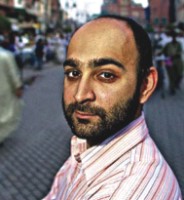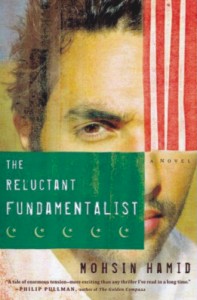|
Interview
The Reluctant Fundamentalist
 |
Mohsin Hamid |
Mohsin Hamid published his first novel, Moth Smoke, in 2000, and his second novel, The Reluctant Fundamentalist in 2007. The Reluctant Fundamentalist has been short-listed for this year's Man Booker Prize. In an exclusive interview with AHMEDE HUSSAIN, Hamid talks about his life as a writer. Will you please tell our readers about how you started writing?
As a child, I started by imagining. I was the sort of boy who could spend entire afternoons day-dreaming. I would imagine that the lawn was an ocean, the mango tree was a ship, and I was sailing away -- that sort of thing. I think most children do this. The difference in my case is that I never stopped, and I started writing down my day-dreams, making them into stories for other people, and I still do this now, at the age of 36. Novel writing is about remaining child-like, holding onto your childishness and making something of it as an adult.
In an interview with the BBC you said (about The Reluctant Fundamentalist): "Because it's a dramatic monologue, and it's set between two people almost as if it's happening on stage, there's a certain sense that it can't possibly be happening this way." How important is point of view or the narrative technique to you?
Point of view and narrative technique is essential. I think of my novels partly in architectural terms: here is the aim of the structure, here are the component parts, here is how they support each other, here is the load they will bear, here is the experience of passing through them. In both of my novels, the reader is asked to play a role, to step into the novel and judge what happens. In The Reluctant Fundamentalist, the dramatic monologue form is an invitation to the reader to do precisely that.
 I have found your "corporate fundamentalism" strikingly new. Will you please tell us a bit about it? I have found your "corporate fundamentalism" strikingly new. Will you please tell us a bit about it?
In "The Reluctant Fundamentalist", the main character, Changez, works in finance. His company determines the value of other companies. He begins to empathize with the employees of the companies he values, people whose value is being reduced to dollars and cents. The novel suggests that this system is perhaps quite an extremist one, and in that sense not so different from religious fundamentalism. Economic fundamentalism can be a brutal ideology, and it is natural that it inspires a backlash.
What do you think are the reasons behind a world of distrust/mistrust/ suspicion that exist between America and the Muslim world?
American foreign policies are an important reason: look at Palestine, Iraq, Afghanistan, etc. But many people in Muslim countries have also tended to blame their own failings -- of which there are many -- on America rather than taking responsibility for those failings themselves. And extreme views in Muslim world, as well as violent actors, tend to be what Americans see when they turn on the news. In the end, we have to break this conflict down to the level of the human: there are 300 million individuals who comprise "America"and over a billion who comprise "the Muslim world." These people cannot be lumped together into simple groups, and should not be thought of that way. Generalisations are dangerous. We realise it is ridiculous to say people act as they do because they are "earthlings." The terms "American" and "the Muslim world" are almost equally vague.
Where does South Asian fiction in English stand in world literature?
For me, that is an impossible question. It is a bit like asking: Where do South Asian wicket-keepers stand in world sport? My answer is: Who knows? There are many superb South Asian writers in English, they vary a great deal in style and subject matter, and that is to be expected since they are drawn from over a billion diverse people.
Post-colonial critics talk about the writing back to the centre...
The term "post-colonial" is one I find very interesting. I was born in Lahore 24 years after Pakistan's independence. I had no memory of a "colonial" period as such, and so found the idea of being "post-colonial" oddly limited and anachronistic. It seemed something that my parents' generation was preoccupied with, not mine. My tendency was to reject the term, and even to find it oddly demeaning, as though it denied people like me the right to be responsible for our own problems by relying on an external actor to blame. I have since come to view the term more positively, and to understand its (possible) potency. Speaking truth to power is an important function of literature, and to the extent that this is a "post-colonial" exercise, it is an aspect that I embrace.
Copyright
(R) thedailystar.net 2007 |
|
